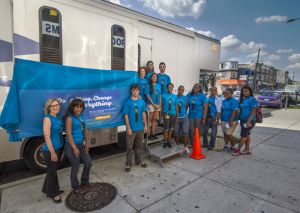
Hepatitis C virus (HCV) is the most common blood-borne illness, affecting three to five million Americans, and many of them don’t even know it. Philadelphia has a high rate of HCV among its residents, who many times have limited access to screening and treatment. So how do you get help to the people who need it the most? You go door to door. A new study, led by a Drexel University College of Medicine researcher and recently published in the Journal of General Internal Medicine, shows that when advocates made a focused effort in a medically underserved area, they were able to help patients get screened, diagnosed and treated.
“This study demonstrates the importance of community-based testing for HCV in identifying previously undiagnosed individuals and re-engaging those aware of their diagnosis but not currently in care,” said the study’s lead author, Stacey Trooskin, MD, PhD, assistant professor in the Division of Infectious Diseases and HIV Medicine. “We learned that a comprehensive approach to nonclinical testing is critical and must integrate immediate access to confirmatory testing as well as intensive patient navigation to effectively link patients to care. Although hepatitis C is now a curable disease, we identified new barriers to care such as the need for a referral to subspecialty care and challenges obtaining medication approval for patients, particularly those covered under Medicaid.”
The “Do One Thing, Change Everything” campaign – a collaboration between Drexel University College of Medicine and Brown University School of Medicine – has been working since December 2012 to stimulate HCV testing in communities with high rates of infection, by literally knocking on doors. Philadelphia is serving as the campaign's model city. The program utilizes a unique mobile lab that offers free, rapid testing. Those with confirmed hepatitis C infections receive a full suite of services to guide patients through the process of gaining health insurance, access to medical specialists, and ultimately, to a hepatitis C cure. The U.S. Food and Drug Administration recently approved several medications that can cure the disease.
“Our paper proves that scaling screening and treatment, even in neighborhoods with the highest rates of infection, is possible. We overcame all the commonly cited obstacles in this high-risk population,” said study co-author Amy Nunn, assistant professor of behavioral and social sciences in the Brown University School of Public Health.
As of February 2014, the Do One Thing team had tested 1,301 people and found that 4 percent had anti-HCV antibodies. When area residents consented to screening, they filled out demographic questionnaires while awaiting results. A third of the people (433 of 1,301) had been incarcerated, many had histories of drug use or mental health conditions, and more than half earned less than $15,000 a year.
Of the 52 people positive for antibodies on the initial screening, only four were already engaged in HCV care. Research has shown that the first critical barrier to treatment is lack of testing to confirm preliminary test results. In Do One Thing, immediate confirmatory testing helped ensure that patients remained in care. The team achieved more than double the rate of confirmatory testing previously reported in the literature.
In addition to Trooskin and Nunn, the study’s other authors are Joanna Poceta, Caitlin Towey, Annajane Yolken, Jennifer Rose, Naija Luqman, Ta-Wanda Preston, Dr. Philip Chan, Dr. Curt Beckwith, Sophie Feller, and Hwajin Lee. Funding for the research came from an HIV FOCUS grant of Gilead Sciences, the National Institutes of Health and the Brown University Alcohol Research Center on HIV.